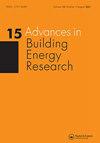Establishing thermal comfort baseline in a sub-tropical region through a controlled climate chamber study
IF 2.5
Q2 CONSTRUCTION & BUILDING TECHNOLOGY
引用次数: 0
Abstract
ABSTRACTClimate chamber-based studies provide a baseline for quantifying thermal comfort. They can be used to compare real-world thermal adaptation to air temperature (Ta), relative humidity (RH) and air movement (Va). Several adaptive thermal comfort studies in subtropical regional established the role of moisture and air movement is crucial in comfort regulation. However, a baseline study in controlled environments demonstrating the combined effect of multiple environmental variable has yet to be available. In this context, this study presents the results of controlled climate-chamber-based thermal comfort experiments performed with 16 acclimatized subjects. Each subject underwent 140 test conditions covering 20–40°C Ta, 30–70% RH, and 0.25–2.0 m/s Va while performing a sedentary activity, yielding 8360 valid subjective responses. The study yielded a Tn of 29.3°C in terms of Ta, while the comfort temperature varied from 25.7 to 32.9°C (Ta). The effect of RH and Va on thermal sensation, comfort and preferences are established. An empirical reformulation of the Tropical Summer Index with thermal sensation and comfort votes is presented. A comparative analysis of the baseline thermal comfort limits with the adaptive comfort limits established by various field studies in the sub-tropical region is presented. Va requirements for just comfortable and acceptably warm conditions are presented for different Ta and RH set-points.KEYWORDS: Thermal comfortclimate chamber studythermoneutralitythermal preferenceair velocity Disclosure statementNo potential conflict of interest was reported by the author(s).Additional informationFundingThis research work is conducted in the Climate Simulator Lab, funded by SMILE, IIT Roorkee [grant number SMILE-100594] received by Prof. Sudhakar Subudhi, and Prof. Rajasekar Elangovan. The instrumentation used in this research is supported by the DST-EPSRC-funded Indo-UK research project on Zero Peak Energy Building Design for India (ZED-I) [grant number DST-1161-APD], received by Prof. Rajasekar Elangovan.通过控制气候室研究建立亚热带地区的热舒适基线
摘要基于气候室的研究为量化热舒适提供了基线。它们可以用来比较真实世界的热适应空气温度(Ta),相对湿度(RH)和空气运动(Va)。一些亚热带地区的适应性热舒适研究表明,湿度和空气运动在舒适性调节中起着至关重要的作用。然而,在受控环境中进行的基线研究表明,多种环境变量的综合影响尚未得到证实。在此背景下,本研究介绍了对16名适应环境的受试者进行的基于受控气候室的热舒适实验的结果。每位受试者在进行久坐活动时接受了140个测试条件,包括20-40°C温度、30-70% RH和0.25-2.0 m/s Va,产生了8360个有效的主观反应。该研究得出的Tn (Ta)为29.3°C,而舒适温度(Ta)为25.7至32.9°C。确定了RH和Va对热感觉、舒适性和偏好的影响。提出了一种基于热感觉和舒适投票的热带夏季指数的经验公式。对基线热舒适限值与亚热带地区各种实地研究建立的适应性舒适限值进行了比较分析。对于不同的Ta和RH设定点,给出了刚刚舒适和可接受的温暖条件的Va要求。关键词:热舒适气候室研究热中性热偏好风速披露声明作者未报告潜在利益冲突。本研究工作在气候模拟器实验室进行,由SMILE和印度理工学院鲁尔基分校资助[批准号SMILE-100594],由Sudhakar Subudhi教授和Rajasekar Elangovan教授接受。本研究中使用的仪器由科技部- epsrc资助的印度-英国研究项目“印度零峰值能耗建筑设计”(ZED-I)提供支持[批准号为DST-1161-APD],由Rajasekar Elangovan教授接收。
本文章由计算机程序翻译,如有差异,请以英文原文为准。
求助全文
约1分钟内获得全文
求助全文
来源期刊

Advances in Building Energy Research
CONSTRUCTION & BUILDING TECHNOLOGY-
CiteScore
4.80
自引率
5.00%
发文量
11
 求助内容:
求助内容: 应助结果提醒方式:
应助结果提醒方式:


